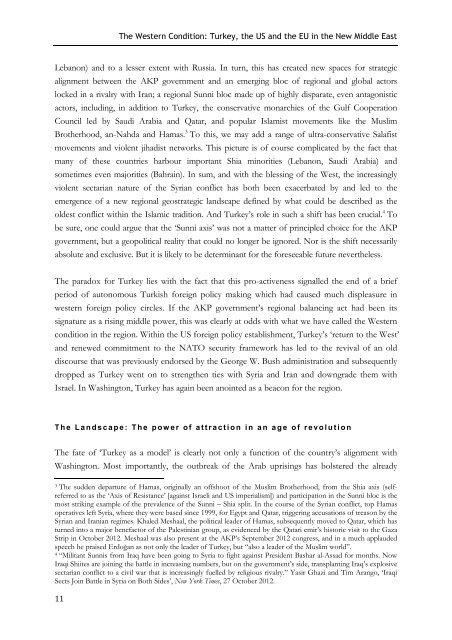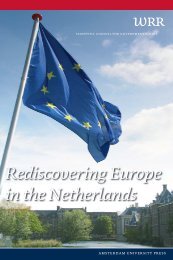The Western Condition - St Antony's College - University of Oxford
The Western Condition - St Antony's College - University of Oxford
The Western Condition - St Antony's College - University of Oxford
You also want an ePaper? Increase the reach of your titles
YUMPU automatically turns print PDFs into web optimized ePapers that Google loves.
<strong>The</strong> <strong>Western</strong> <strong>Condition</strong>: Turkey, the US and the EU in the New Middle East<br />
Lebanon) and to a lesser extent with Russia. In turn, this has created new spaces for strategic<br />
alignment between the AKP government and an emerging bloc <strong>of</strong> regional and global actors<br />
locked in a rivalry with Iran; a regional Sunni bloc made up <strong>of</strong> highly disparate, even antagonistic<br />
actors, including, in addition to Turkey, the conservative monarchies <strong>of</strong> the Gulf Cooperation<br />
Council led by Saudi Arabia and Qatar, and popular Islamist movements like the Muslim<br />
Brotherhood, an-Nahda and Hamas. 3 To this, we may add a range <strong>of</strong> ultra-conservative Salafist<br />
movements and violent jihadist networks. This picture is <strong>of</strong> course complicated by the fact that<br />
many <strong>of</strong> these countries harbour important Shia minorities (Lebanon, Saudi Arabia) and<br />
sometimes even majorities (Bahrain). In sum, and with the blessing <strong>of</strong> the West, the increasingly<br />
violent sectarian nature <strong>of</strong> the Syrian conflict has both been exacerbated by and led to the<br />
emergence <strong>of</strong> a new regional geostrategic landscape defined by what could be described as the<br />
oldest conflict within the Islamic tradition. And Turkey’s role in such a shift has been crucial. 4 To<br />
be sure, one could argue that the ‘Sunni axis’ was not a matter <strong>of</strong> principled choice for the AKP<br />
government, but a geopolitical reality that could no longer be ignored. Nor is the shift necessarily<br />
absolute and exclusive. But it is likely to be determinant for the foreseeable future nevertheless.<br />
<strong>The</strong> paradox for Turkey lies with the fact that this pro-activeness signalled the end <strong>of</strong> a brief<br />
period <strong>of</strong> autonomous Turkish foreign policy making which had caused much displeasure in<br />
western foreign policy circles. If the AKP government’s regional balancing act had been its<br />
signature as a rising middle power, this was clearly at odds with what we have called the <strong>Western</strong><br />
condition in the region. Within the US foreign policy establishment, Turkey’s ‘return to the West’<br />
and renewed commitment to the NATO security framework has led to the revival <strong>of</strong> an old<br />
discourse that was previously endorsed by the George W. Bush administration and subsequently<br />
dropped as Turkey went on to strengthen ties with Syria and Iran and downgrade them with<br />
Israel. In Washington, Turkey has again been anointed as a beacon for the region.<br />
<strong>The</strong> Landscape: <strong>The</strong> power <strong>of</strong> attraction in an age <strong>of</strong> revolution<br />
<strong>The</strong> fate <strong>of</strong> ‘Turkey as a model’ is clearly not only a function <strong>of</strong> the country’s alignment with<br />
Washington. Most importantly, the outbreak <strong>of</strong> the Arab uprisings has bolstered the already<br />
3 <strong>The</strong> sudden departure <strong>of</strong> Hamas, originally an <strong>of</strong>fshoot <strong>of</strong> the Muslim Brotherhood, from the Shia axis (selfreferred<br />
to as the ‘Axis <strong>of</strong> Resistance’ [against Israeli and US imperialism]) and participation in the Sunni bloc is the<br />
most striking example <strong>of</strong> the prevalence <strong>of</strong> the Sunni – Shia split. In the course <strong>of</strong> the Syrian conflict, top Hamas<br />
operatives left Syria, where they were based since 1999, for Egypt and Qatar, triggering accusations <strong>of</strong> treason by the<br />
Syrian and Iranian regimes. Khaled Meshaal, the political leader <strong>of</strong> Hamas, subsequently moved to Qatar, which has<br />
turned into a major benefactor <strong>of</strong> the Palestinian group, as evidenced by the Qatari emir’s historic visit to the Gaza<br />
<strong>St</strong>rip in October 2012. Meshaal was also present at the AKP’s September 2012 congress, and in a much applauded<br />
speech he praised Erdoğan as not only the leader <strong>of</strong> Turkey, but “also a leader <strong>of</strong> the Muslim world”.<br />
4 “Militant Sunnis from Iraq have been going to Syria to fight against President Bashar al-Assad for months. Now<br />
Iraqi Shiites are joining the battle in increasing numbers, but on the government’s side, transplanting Iraq’s explosive<br />
sectarian conflict to a civil war that is increasingly fuelled by religious rivalry.” Yasir Ghazi and Tim Arango, ‘Iraqi<br />
Sects Join Battle in Syria on Both Sides’, New York Times, 27 October 2012.<br />
11

















